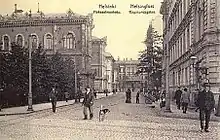Keskuskatu
Keskuskatu, literally "Central Street" (Finland Swedish: Centralgatan), is a two block-long pedestrian street in the centrally-located Kluuvi neighborhood of Helsinki, Finland. Along the street are located (from south to north): the Stockmann department store, the Rautatalo building, Domus Litonii, the World Trade Center and the Citycenter Mall, nicknamed "Makkaratalo" (lit. "sausage house"). Keskuskatu begins at Pohjoisesplanadi, across from the Swedish Theatre, and ends when it meets Kaivokatu, across from Helsinki Central Station.[1] It is intersected just south of its midpoint by Aleksanterinkatu.
| Finland Swedish: Centralgatan | |
 Keskuskatu at night, decorated for Christmas 2020 | |
.svg.png.webp) Location within Greater Helsinki | |
| Former name(s) | Hakasalmenkatu Finland Swedish: Hagasundsgatan |
|---|---|
| Length | 284 m (932 ft) |
| Width | 21 m (69 ft) |
| Location | Kluuvi, Vironniemi, Helsinki, Finland |
| Postal code | 00100 |
| Nearest metro station | Rautatientorin metroasema |
| Coordinates | 60.16902°N 24.94291°E |
| South end | Pohjoisesplanadi |
| Major junctions | Aleksanterinkatu |
| North end | Kaivokatu |
| Construction | |
| Commissioned | 13 June 1927 |
| Inauguration | 12 December 1928 |
| Other | |
| Designer | Eliel Saarinen |
| Status | Pedestrianized |

History
_in_1910s.svg.png.webp)
The street was originally named Hakasalmenkatu (literally "Hakasalmi Street"), Finland Swedish: Hagasundsgatan) and was only one block long, stretching from Aleksanterinkatu to Kaivokatu. The idea to extend the street through a city block to ease traffic congestion between Esplanadi park and the central railway station was first proposed by Helsinki Building Supplies, Ltd. (Finnish: Helsingin Rakennuskauppa Oy) in 1913. A design contest for the proposed street was announced at the time, but ultimately never conducted due to the outbreak of World War I.[2]
In 1916, the businessman Allan Hjelt and the architect Eliel Saarinen started warming up the idea about punching the street through a city block. Their company Ab Centralgatan Oy bought Helsingin Rakennuskauppa Oy (named Oy Building at the time) and received ownership of the properties on Aleksanterinkatu 52 and Pohjoinen Esplanadikatu 37–41. Saarinen made plans of the street and its business properties in the same year, originally about one street's width to the side of Hakasalmenkatu. The plan was published at the end of the year and was received by the city council for consideration. The council approved the plan in March 1917, but decided that a straight line with Hakasalmenkatu would be better for traffic.[2]
In the end of the year 1919 the city and the company Ab Centralgatan Oy started negotiations about moving the street as a direct continuation of Hakasalmenkatu. Soon Ab Stockmann Oy joined the negotiations, and ended up buying the entire company in April 1920. So the street was built as a direct continuation of Hakasalmenkatu all the way up to Pohjoisesplanadi according to the zoning plan approved in 1920, also giving the Stockmann block its current form.[2] Continuing the street also affected the construction plans of the department store, requiring the dismantling of several old buildings such as the old premises of Café Ekberg. Stockmann also received the right to build storage facilities under the street, which has later allowed building an underground corridor connecting the department store with the Akateeminen Kirjakauppa book store. In 1928 the street received its current name according to a proposal from Stockmann.[3]
Keskuskatu was later changed to a walking street in a renovation completed in summer 2014. As part of the renovation, the street was paved with the non-repeating Penrose tiling.[4][5]
Keskuskatu is one of the properties in the original Finnish edition of Monopoly.
See also
References
- "Keskuskatu" [Central Street]. Helsinki Map Service (in Finnish). Retrieved August 11, 2022.
- Putkonen, Lauri; Litonius, Marie-Louise (1997). Domus Litonii 1847-1997 (in Finnish). Helsinki: Kiinteistöyhtymä Domus Litonii. pp. 50–53. ISBN 978-952-90-9325-0. OCLC 58305679.
- Painos, Toinen Korjattu (1981). "Helsingin kadunnimet" [Helsinki Lost, History of Helsinki Street Names] (PDF). Helsingin Kaupungin Tilastolliset Vuosikirjat. 1 (in Finnish). Helsinki. p. 110. Archived (PDF) from the original on February 24, 2015. Retrieved August 11, 2022.
- "Keskuskadun kävelykadusta voi tulla matemaattisen hämmästelyn kohde" [The pedestrian street on Keskuskatu can become the object of mathematical astonishment]. Helsingin Sanomat (in Finnish). August 6, 2014. Retrieved August 11, 2022.
- Kivelä, Simo K. (March 23, 2011). "Matematiikan Koe: Pitkä Oppimäärä" [Mathematics Test: Long Learning] (PDF) (in Finnish). Helsinki University of Technology. Archived (PDF) from the original on April 1, 2017. Retrieved August 11, 2022.
External links
 Media related to Keskuskatu at Wikimedia Commons
Media related to Keskuskatu at Wikimedia Commons